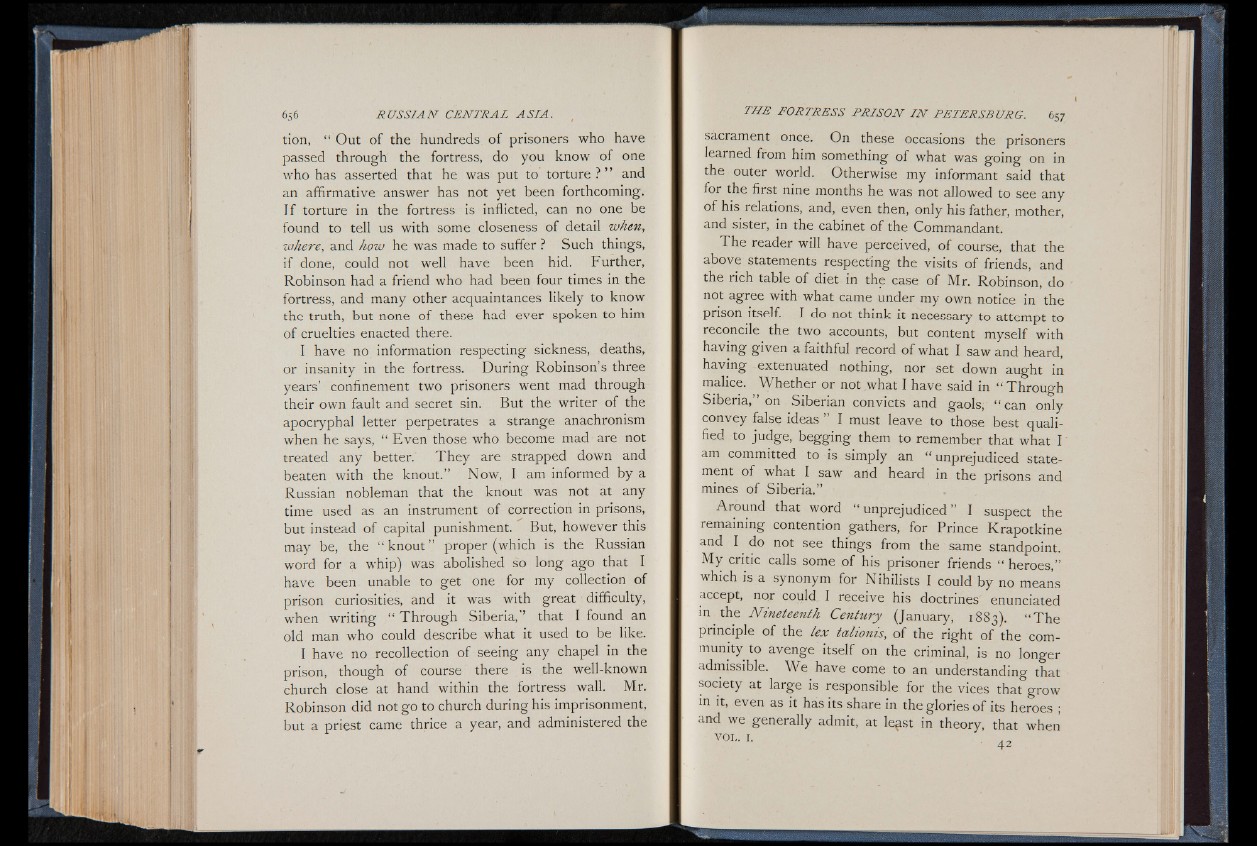
tion, “ Out of the hundreds of prisoners who have
passed through the fortress, do you know of one
who has asserted that he was put to torture?” and
an affirmative answer has not yet been forthcoming.
I f torture in the fortress is inflicted, can no one be
found to tell us with some closeness of detail when,
where, and how he was made to suffer ? Such things,
if done, could not well have been hid. Further,
Robinson had a friend who had been four times in the
fortress, and many other acquaintances likely to know
the truth, but none of these had ever spoken to him
of cruelties enacted there.
I have no information respecting sickness, deaths,
or insanity in the fortress. During Robinson’s three
years’ confinement two prisoners went mad through
their own fault and secret sin. But the writer of the
apocryphal letter perpetrates a strange anachronism
when he says, “ Even those who become mad are not
treated any better. They are strapped down and
beaten with the knout.” Now, I am informed by a
Russian nobleman that the knout was not at any
time used as an instrument of correction in prisons,
but instead of capital punishment. But, however this
may be, the “ knout ” proper (which is the Russian
word for a whip) was abolished so long ago that I
have been unable to get one for my collection of
prison curiosities, and it was with great i difficulty,
when writing “ Through Siberia, ’ that I found an
old man who could describe what it used to be like.
I have no recollection of seeing any chapel in the
prison, though of course there is the well-known
church close at hand within the fortress wall. Mr.
Robinson did not go to church during his imprisonment,
but a priest came thrice a year, and administered the
sacrament once. On these occasions the prisoners
learned from him something of what was going on in
the outer world. Otherwise my informant said that
for the first nine months he was not allowed to see any
of his relations, and, even then, only his father, mother,
and sister, in the cabinet of the Commandant.
The reader will have perceived, of course, that the
above statements respecting the visits of friends, and
the rich table of diet in the case of Mr. Robinson, do
not agree with what came under my own notice in the
prison itself. I do not think it necessary to attempt to
reconcile the two accounts, but content myself with
having given a faithful record of what I saw and heard,
having extenuated nothing, nor set down aught in
malice. Whether or not what I have said in “ Through
Siberia,” on Siberian convicts and gaols, “ can only
convey false ideas ” I must leave to those best qualified
to judge, begging them to remember that what I
am committed to is simply an “ unprejudiced statement
of what I saw arid heard in the prisons and
mines of Siberia.”
Around that word “ unprejudiced ” I suspect the
remaining contention gathers, for Prince Krapotkine
and I do not see things from the same standpoint.
My critic calls some of his prisoner friends " heroes,”
which is a synonym for Nihilists I could by no means
accept, nor coqld I receive his doctrines enunciated
in the Nineteenth Century (January, 1883). “ The
principle of the lex talionis, of the right of the community
to avenge itself on the criminal, is no longer
admissible. We have come to an understanding that
society at large is responsible for the vices that grow
in it, even as it has its share in the glories of its heroes ;
and we generally admit, at le^st in theory, that when
V01'- I- ■ 42